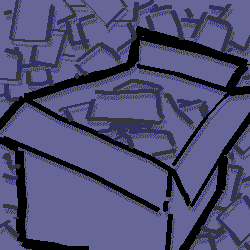AD/HD: Managing Clutter
 Tara McGillicuddy over at Living with ADD had an interesting blog about clutter a few days ago. She listed some simple ways to deal with it. People with Attention Deficit Disorder tend to take normal tendencies to be disorganized and magnify them. They also have a harder time rolling up their sleeves to fix the messes they made.
Tara McGillicuddy over at Living with ADD had an interesting blog about clutter a few days ago. She listed some simple ways to deal with it. People with Attention Deficit Disorder tend to take normal tendencies to be disorganized and magnify them. They also have a harder time rolling up their sleeves to fix the messes they made.Procrastination is a big problem for adults with ADD, but I believe the most insidious affect of ADD is our tendency to get distracted when things get boring. What makes this process different for me than compared to somebody who doesn't have ADD is that the moment between boredom and distraction is so lightening quick I don't even notice it. It's not really a choice as much as an event. I can be riding down the road with the windows down, singing at the top of my lungs, before I suddenly wonder why I hadn't finished uncluttering the shed.
Another problem with cleaning clutter for adults with ADD is that each item can be a dangerous distraction. When I first was married, my wife used to get impatient with me because I would start reading the piles of papers I was organizing, or start watching the video tape I was supposed to be putting back on the shelf. Drove her mad.
I've made improvements since those days. I've developed systems that work for me. Tara listed three groupings that were very surprisingly similar to mine. Each item must be sorted quickly into one of three piles. Sentimentality must be put aside. I've become very good at it. Here's how I break down a pile of clutter:
- Trash
- Give Away
- Keepers
If you don't use it, lose it.and my favorite...
When in doubt, throw it out.They are the secret to my clutter cleaning success. I haven't been successful in converting my wife to my way of thinking, but my oldest daughter embraces it with zeal, much to her sisters' chagrin. At least I don't throw other people's belongings away. Now if only I could stop myself from creating more clutter1...
So, chuck everything away if you can, give away the rest, then you're left with the keepers - items of intrinsic value and memory. Before I had children I would spend my money on various tchotchkes. I really valued those stupid baubles. Soon, however, I didn't have room to display them all. What good were they doing stored in a box? Now I have boxes of them that I can't even move on eBay. Clutter. Expensive, fancy, clutter. Before we pack up to settle in a new home, they'll all disappear. I shan't move them again.
One note about the Keepers. You need to be committed to making the pile go away, not shift it into a new box and stuff it inside the closet. So the Keeper pile needs to be broken down into smaller piles and dealt with. I have a simple expression that I use when dealing with Keepers:
Give it a home.If the Keeper doesn't have a home, I rethink its status and often toss it or donate it. Depending on the size of your original pile of clutter, you may not have time to completely give everything a home. You need to develop the discipline to come back to the Keepers later so that they don't become lost in clutter again. Using this system you can make short work of clutter and reclaim your life. Just remember to sort quickly and dump the trash with swift justice.
Coping Strategies:
1) I am developing techniques to reduce clutter in my life. I call it following the principles of tidiness. If I don't make messes I won't have any to clean up. Lately, I've been tackling the problem of junk folders on my computer. They use up valuable hard drive space and are filled with hundreds of potential distractions. That type of clutter is as real as the pile by my door. The same principles and techniques could solve both problems. I hope to share my findings with you before the end of the year.
Comments